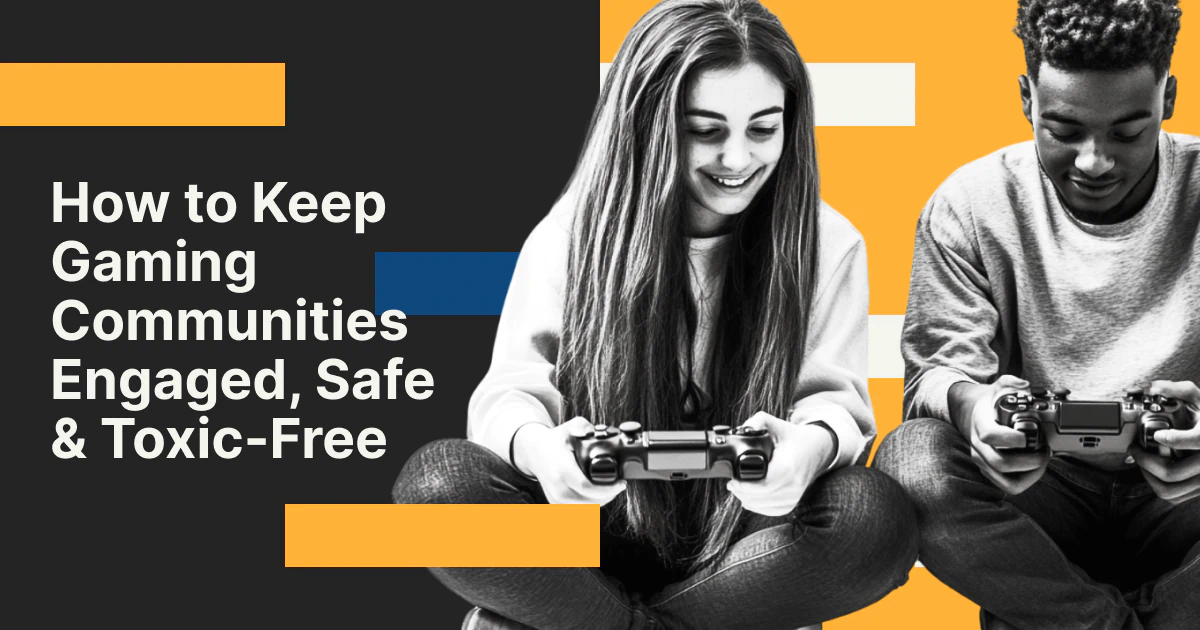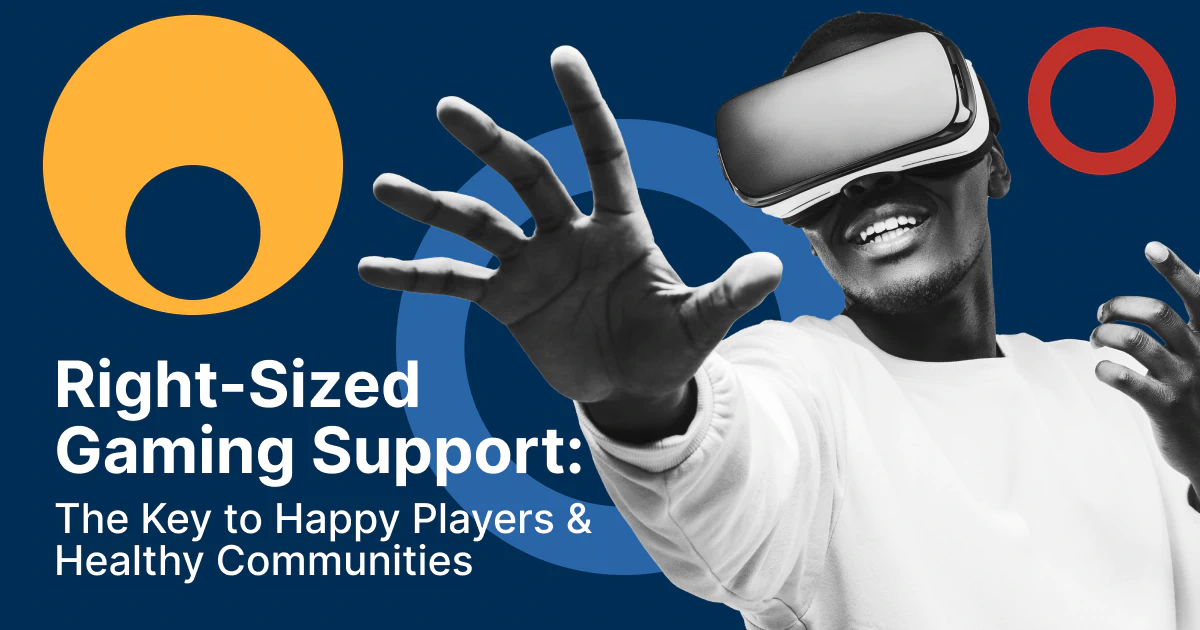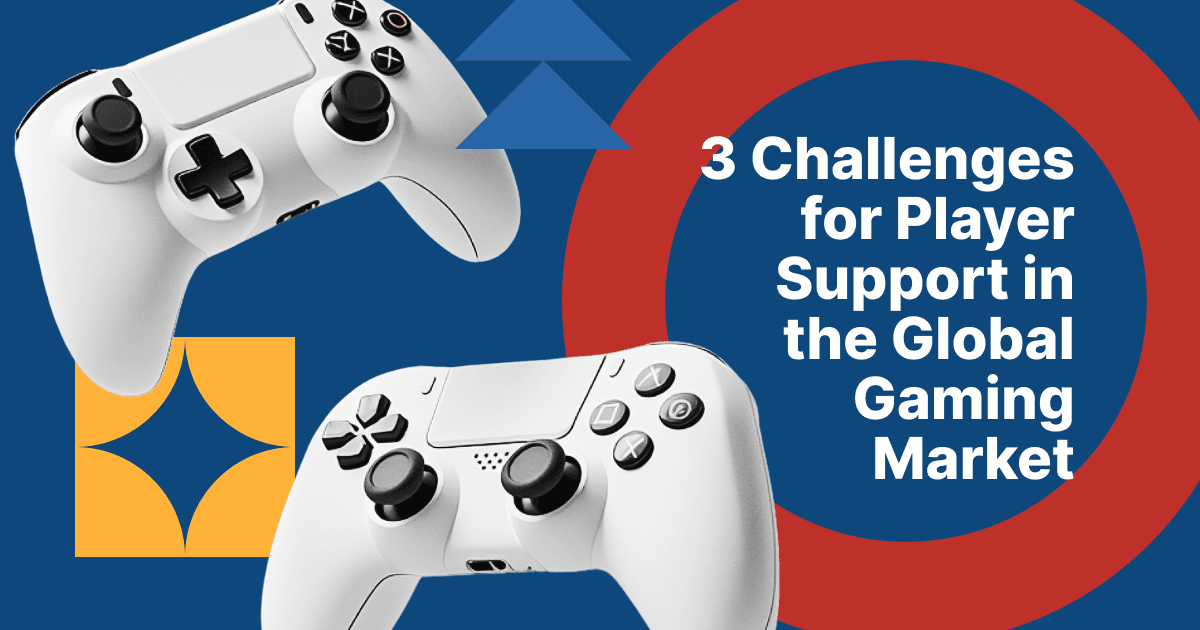Moderation in Gaming Communities
Gaming communities aren't like your standard online spaces. They're fast, chaotic, and constantly shifting, with new slang, memes, and inside jokes popping up daily. Whether you're running a Discord server for a major game studio, moderating a Twitch chat during a high-stakes tournament, supervising in-game chat or running an official forum, keeping things fair, fun, and free from toxicity is a delicate balancing act.
Too much moderation and you risk killing the hype around your game and pushing away players. Too little, and you're suddenly managing a digital wasteland of toxicity at best, and at worst, waking up to classified military leaks on your servers, for the eighth time—in the same year.
While your average community probably won't get audited by the Pentagon, the point is that gamers can get passionate about their communities. Passionate players are great when handled right, a disaster when ignored, and a missed opportunity if stifled. So how do you strike that balance? How do you build a healthy community that protects your brand—without also turning into the fun police? Let's break it down.
Three Challenges Of Community Moderation
Culture Moves at Hyperspeed
Gaming culture moves fast—faster than most moderation tools can keep up. What starts as "gg ez" turns into "ggez," then morphs into sarcastic variations. It's a never-ending cycle, and if your moderation strategy doesn't account for context, you're either missing real issues or banning harmless banter.
Platforms have tried to outsmart toxic players by censoring slurs and replacing them with harmless words. Sweeping attempts at systemic language moderation generally backfire. Even AI can't keep up with the culture, especially when players learn how to outsmart the system. There's even an official term for the practice, known as algospeak.
Here are just a few examples of how bad actors try to dodge the bots with algospeak:
- Slur replacement: Players often swap in a new word or phrase when a term gets banned, which quickly takes on the same meaning. The cycle repeats, making it a game of cat and mouse for moderation teams.
- Look-alike Tricks: Players manipulate spelling, spacing, or numbers to create words that evade filters but are still recognizable to their community.
- Cross-subject references: Hidden meanings in unrelated terms. Words from gaming, pop culture, or even unrelated topics are co-opted to spread harmful messages without detection.
The list goes on and on, with countless automated attempts backfiring. One platform attempted to tackle a common slur by automatically replacing it with a commonplace word. The assumption? If the offensive term literally didn't appear, players would stop using it.
Instead, the community immediately caught on and twisted the censorship into something new. The original slur was dropped entirely, and the new word took its place as the insult of choice. The platform's well-intentioned automation didn't erase toxicity—it just shifted the goalposts.
There's a Thin Line Between Bad and Bannable
Gaming is competitive. Frustration runs high, and when matches go south, players look for someone to blame. But being bad at the game isn't usually a bannable offense—deliberately sabotaging the team is.
Take this specific scenario from a multiplayer online battle arena game, or MOBA for short: Player X locks in the support role but picks a DPS instead. Rather than helping the team, they farm jungle mobs in silence, avoid objectives, and end the match with a 0–20 K/D ratio.
To someone without knowledge of MOBA, the above statement can seem like gibberish, let alone trying to parse the offense. What's being described here isn't poor gameplay—it's a player sabotaging the match.
There's a fine line between playstyle mistakes and griefing. Intentional feeding, repeated AFK behavior, and active harassment in voice or text chat? Bannable. A player testing an off-meta strategy, a newcomer making bad decisions, or someone simply having a rough game? That's just part of the experience.
This same concept extends throughout spaces like Discord and Twitch. Someone in chat spamming nonsense or mocking teammates? Probably needs a warning or a mute. But someone who's just a little annoying? That's subjective. Identifying the line between offensive and innocuous is essential to keeping gaming communities fair, competitive, and fun.
When Mods Don't Get It, Communities Suffer
Moderation isn't just about enforcing rules—it's about understanding the game, the players, and the culture. But with the wrong type of moderators, things start to break down.
Some teams outsource moderation to generic agents who aren't gamers themselves. They can flag obvious violations, but they don't understand the nuances of competitive banter, in-game strategy, or evolving community slang. That leads to tone-deaf moderation, where harmless interactions get punished while real toxicity slips through.
On the other hand, community volunteers bring passion but not always consistency. They're deeply involved in the game, but without training, tools, or escalation paths, they're often left making inconsistent calls, struggling to keep up, or burning out. And when moderation fails—over-policing, under-policing, or collapsing altogether—the entire community suffers.
Without the right balance, spaces become toxic, unwelcoming, or flat-out unusable. Spammers take over, bad actors push boundaries unchecked, and once-thriving communities lose engagement and trust.
Three Keys to Excellent Moderation
Define Clear Community Guidelines
Guidelines shape the entire culture of the community from day one—every word matters. How your rules are written will influence everything from technical moderation choices to player interactions. When creating guidelines, you're trying to engineer a system that works for your community.
These rules also vary depending on the type of culture you want to cultivate. An FPS with a competitive edge will naturally allow for more aggressive banter than a Minecraft server built for collaboration. A ranked PvP game has different moderation needs than a co-op survival experience. A vague "no toxicity" policy won't cut it. Without specifics, enforcement feels random, leading to frustration and distrust.
This is where experienced support partners come in. Professionals who understand online spaces and scalable moderation can help refine these policies, ensuring they're clear, actionable, and adaptable as language, trends, and player behavior evolve.
Well-crafted, consistently enforced guidelines reduce boundary-pushing, eliminate gray areas, and ensure that the community culture aligns with the game itself. When players trust the system, they respect it—and that's the key to a thriving community.
Layer Auto-Mods and Pro-Mods
Automation has its place in moderation—it's fast, efficient, and can catch obvious rule violations in real time. It's tough to find any Twitch chat these days without an Auto-Mod active. But automation alone isn't enough. Language evolves too quickly, context matters, and gaming communities are experts at finding loopholes. A bot can filter slurs but can't differentiate between friendly banter, sarcasm, or an inside joke.
That's why human moderators—especially mods who are also gamers—are at the heart of any good community operation. These are moderators who can stay tuned into the community and understand the culture, making them far better equipped to spot context-dependent toxicity, emerging code words, and evolving slang.
They bring the nuance that automation lacks. They can catch disguised slurs and shifting trends before they spiral. They protect the spirit of the game, ensuring that moderation doesn't stifle the natural personality of the community.
When automation and mods work together, moderation becomes fast, fair, and in sync with the community. AI catches what's obvious, but real people ensure the system isn't blindly punishing harmless interactions.
Invest in Moderators Who Get It
Great moderation starts with passion. The best moderators get the lingo, the culture, the inside jokes, and most importantly, they know when to intervene and when to let things play out.
But passion alone isn't enough. Relying purely on volunteers grinding through endless chat logs and support tickets leads to burnout, inconsistency, and high turnover. Without structure, backup, and the right tools, even the best fan moderators will struggle to keep up with a fast-moving community.
It might seem like you're stuck choosing between community-oriented volunteers or efficient, generic moderation.
The truth is, you don't have to choose. You just need to find the right industry partner.
Experienced moderation partners who've been in the industry for years know that the best mods are the ones who care about the game. That's why the right partner lets their professional moderators choose their own projects, ensuring that the people managing your community are actual fans who want to be there.
That passion is backed by structure, consistency, and the right tools to prevent burnout. With rotating schedules, escalation paths, and proper training, professional mods can handle high-stress situations without getting overwhelmed—all while bringing the cultural fluency and in-game knowledge that makes moderation feel natural, not forced.
That means your community gets the best of both worlds—moderators who care about the game AND have the experience and support to do the job right.
Moderation Builds Strong Communities
Moderation is about building systems that work—where automation supports human judgment, guidelines shape culture, and mods have the resources to do their jobs without burning out.
When these elements work together, moderation stops feeling like a fight and starts feeling like a foundation. If players trust the system, they stick around. If moderators feel supported, they stay invested. If the culture is nurtured properly, the community grows stronger, making the space one players want to be part of for the long run.




